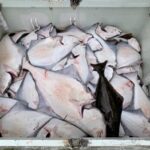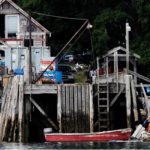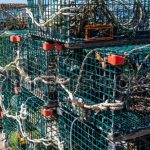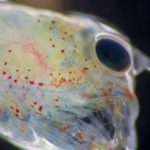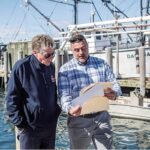Category Archives: Canada
Cancelling legal elver fishery has not stopped poaching in N.S.
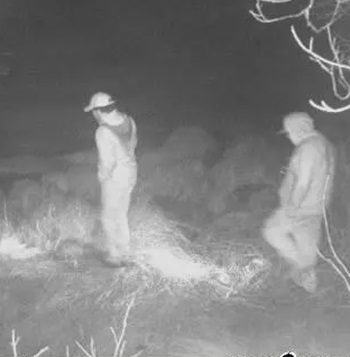 Nova Scotia RCMP have charged a Parrsboro man with multiple criminal counts after a night time altercation with fishery officers attempting to stop illegal elver fishing in Hubbards this weekend. The Department of Fisheries and Oceans says its officers tried to inspect a vehicle on Saturday “as part of their normal activities to deter and disrupt unauthorized elver harvest.” “An individual obstructed fishery officers from conducting the inspection and struck the officers with their vehicle while fleeing to attempt to avoid arrest. “The fishery officers involved were not injured and alerted local RCMP to the incident,” more, >>click to read<< 19:03
Nova Scotia RCMP have charged a Parrsboro man with multiple criminal counts after a night time altercation with fishery officers attempting to stop illegal elver fishing in Hubbards this weekend. The Department of Fisheries and Oceans says its officers tried to inspect a vehicle on Saturday “as part of their normal activities to deter and disrupt unauthorized elver harvest.” “An individual obstructed fishery officers from conducting the inspection and struck the officers with their vehicle while fleeing to attempt to avoid arrest. “The fishery officers involved were not injured and alerted local RCMP to the incident,” more, >>click to read<< 19:03
What You Need to Know About Cod
As a large, naturally abundant fish, cod has been eaten by various human populations for centuries. 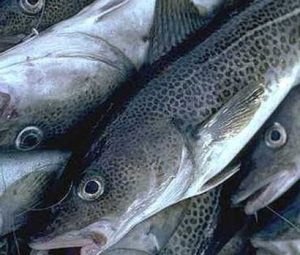 While both of America’s Atlantic cod fisheries are overfished, American stocks of Pacific cod (Gadus macrocephalus) are not. What’s more, various other cod fisheries are located around the globe, some over-exploited, others not. The fish’s prevalence, along with its suitability for eating, means that despite dwindling numbers, cod remains a stalwart of many cuisines. However, there are many things about cod that aren’t widely known. It might surprise some people to learn that cod hunt for prey. They eat a variety of animals, ranging from worms to lobsters and even small fish. Such a diet means cod are capable of growing up to an impressive length of six feet and a weight of over 100 pounds. more, >>click to read<< 11:52
While both of America’s Atlantic cod fisheries are overfished, American stocks of Pacific cod (Gadus macrocephalus) are not. What’s more, various other cod fisheries are located around the globe, some over-exploited, others not. The fish’s prevalence, along with its suitability for eating, means that despite dwindling numbers, cod remains a stalwart of many cuisines. However, there are many things about cod that aren’t widely known. It might surprise some people to learn that cod hunt for prey. They eat a variety of animals, ranging from worms to lobsters and even small fish. Such a diet means cod are capable of growing up to an impressive length of six feet and a weight of over 100 pounds. more, >>click to read<< 11:52
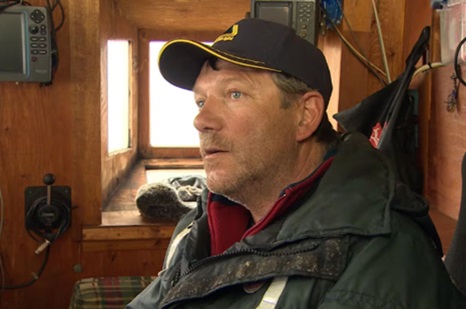
An appeal for seal: Supporters say it’s time to review bans on ‘sustainable’ industry
Fisheries managers allow some 400,000 harp seals to be harvested annually, but the allowable catch hasn’t been taken in the past 15 years. These days, hunters only take about 40,000 seals because of international bans that have dramatically reduced access to markets. The United States has had a ban on seal products since 1972, the European Union banned seal products in 2009, and the Chinese market also has restrictions. But while the sealing industry struggles to stay alive, it’s a way of life that continues. Eldred Woodford, president of the Canadian Sealers Association, has been eating seal his entire life. He’s frustrated that more people aren’t seeing the value of an abundant food source just off the coast. “It’s a waste of a resource. That’s what it is,” he said. more, >>click to read<< 10:03
Seal oil is the best source of omega-3 and other facts about Canada’s misunderstood seal harvest
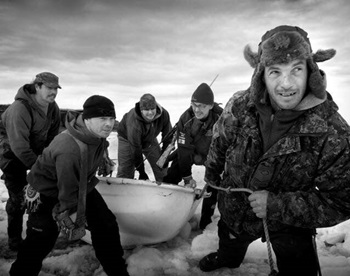 Contrary to narratives spun by anti-sealing groups for decades, this practice is a testament to resilience and a crucial pillar of sustainability and economic survival. Despite numerous fear factors, some substantiated and others frivolous, coastal communities still rely on and support the responsible harvest of seals. For coastal Canadians, the ocean has been and continues to be a source of food, economic activity, recreation, and livelihood. Let’s follow the facts trail: The seal harvest uses techniques designed by a panel of international expert veterinarians. Seals eat 53 times more fish yearly than the entire Eastern Canadian fishing fleet catches. Government scientists have stated that seal predation is preventing the rebuilding of five fish species listed under the Species at Risk Act. >> click to read <<14:52
Contrary to narratives spun by anti-sealing groups for decades, this practice is a testament to resilience and a crucial pillar of sustainability and economic survival. Despite numerous fear factors, some substantiated and others frivolous, coastal communities still rely on and support the responsible harvest of seals. For coastal Canadians, the ocean has been and continues to be a source of food, economic activity, recreation, and livelihood. Let’s follow the facts trail: The seal harvest uses techniques designed by a panel of international expert veterinarians. Seals eat 53 times more fish yearly than the entire Eastern Canadian fishing fleet catches. Government scientists have stated that seal predation is preventing the rebuilding of five fish species listed under the Species at Risk Act. >> click to read <<14:52
State lawsuit claims federal government owes Alaska $700 billion for quashing Pebble mine
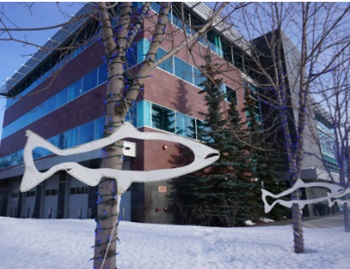 The federal government owes Alaska more than $700 billion in compensation for the 2023 Environmental Protection Agency action that blocked development of the massive and controversial Pebble Mine in Southwest Alaska, Gov. Mike Dunleavy’s administration claims in a lawsuit filed in a federal court. The lawsuit, filed Thursday in the U.S. Court of Federal Claims in the District of Columbia, is part of a flurry of legal actions by the state and the mine’s would-be developer that seek to revive the massive copper and gold project. In its complaint filed Thursday with the U.S. Court of Federal Claims, the state cited an estimate for 100 years of production to support the $700 billion figure. And it said Alaska had been depending on Pebble development for its economic future. more, >>click to read<< 09:26
The federal government owes Alaska more than $700 billion in compensation for the 2023 Environmental Protection Agency action that blocked development of the massive and controversial Pebble Mine in Southwest Alaska, Gov. Mike Dunleavy’s administration claims in a lawsuit filed in a federal court. The lawsuit, filed Thursday in the U.S. Court of Federal Claims in the District of Columbia, is part of a flurry of legal actions by the state and the mine’s would-be developer that seek to revive the massive copper and gold project. In its complaint filed Thursday with the U.S. Court of Federal Claims, the state cited an estimate for 100 years of production to support the $700 billion figure. And it said Alaska had been depending on Pebble development for its economic future. more, >>click to read<< 09:26
FFAW pleads with fisheries minister to open market, arguing harvest too much for local processors
 The Fish, Food & Allied Workers union (FFAW) formally urged Fisheries Minister Elvis Loveless to open the fisheries to outside buyers in a letter on Friday, following a week of intensifying protests from harvesters. The letter is a response to Loveless’s own letter from Thursday evening, in which he requested a plan from the union that would guarantee the jobs of all FFAW members, harvesters, and fish plant workers if the market opens. “Any decision to allow outside buyers must consider the impacts on all partners in the seafood industry, and particularly on fish plant workers,” Loveless says in his letter, adding that if such a plan is presented by the FFAW, the government will consider opening the market to outside buyers for snow crab. more, >>click to read<< 19:38
The Fish, Food & Allied Workers union (FFAW) formally urged Fisheries Minister Elvis Loveless to open the fisheries to outside buyers in a letter on Friday, following a week of intensifying protests from harvesters. The letter is a response to Loveless’s own letter from Thursday evening, in which he requested a plan from the union that would guarantee the jobs of all FFAW members, harvesters, and fish plant workers if the market opens. “Any decision to allow outside buyers must consider the impacts on all partners in the seafood industry, and particularly on fish plant workers,” Loveless says in his letter, adding that if such a plan is presented by the FFAW, the government will consider opening the market to outside buyers for snow crab. more, >>click to read<< 19:38
Ocean Choice sells Nova Scotia offshore scallop quota
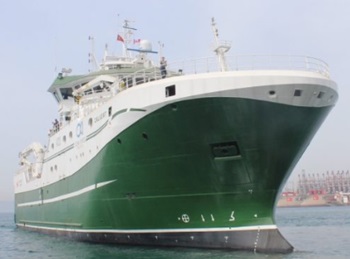 Ocean Choice International has sold its offshore Nova Scotia scallop quotas to three Nova Scotia companies with a long history harvesting sea scallops off the coast of Nova Scotia – Mersey Seafoods Limited, LaHave Seafoods Limited and Comeau’s Sea Foods Limited. ‘We are committed to sustainably growing our place in the fishery in Newfoundland and Labrador; and this decision supports our investment and growth in our business and the fishing industry here at home,’ said Ocean Choice CEO Martin Sullivan. As part of the agreement, Ocean Choice is also acquiring Newfoundland and Labrador offshore quota for Greenland halibut and northern cod from Mersey, and Greenland halibut, northern cod and redfish from LaHave, further strengthening the company’s Newfoundland- and Labrador-based business. more, >>click to read<< 10:21
Ocean Choice International has sold its offshore Nova Scotia scallop quotas to three Nova Scotia companies with a long history harvesting sea scallops off the coast of Nova Scotia – Mersey Seafoods Limited, LaHave Seafoods Limited and Comeau’s Sea Foods Limited. ‘We are committed to sustainably growing our place in the fishery in Newfoundland and Labrador; and this decision supports our investment and growth in our business and the fishing industry here at home,’ said Ocean Choice CEO Martin Sullivan. As part of the agreement, Ocean Choice is also acquiring Newfoundland and Labrador offshore quota for Greenland halibut and northern cod from Mersey, and Greenland halibut, northern cod and redfish from LaHave, further strengthening the company’s Newfoundland- and Labrador-based business. more, >>click to read<< 10:21
Key FFAW rep steps down amid ongoing crab price formula negotiations
 A key negotiator for the Fish, Food & Allied Workers union has stepped down amid ongoing tense and highly anticipated crab price formula negotiations between the harvesters’ union and the Association of Seafood Producers. As first reported, FFAW negotiator Jake Rice has resigned. The news was flagged in a Facebook post in a fishery group by harvester Jason Sullivan. Sullivan wrote FFAW secretary treasurer Jason Spingle is likely to take the reins. For weeks they’ve stood on the steps in front of Confederation Building and flooded the public gallery of the House of Assembly to voice their concerns over the handling of the fishery, now just weeks away from the start of crab season. Harvesters are calling for an open market — the ability to take their catch, regardless of species, to whichever buyer will take the product, whether that be within the province or outside it. more, >>click to read<< 13:30
A key negotiator for the Fish, Food & Allied Workers union has stepped down amid ongoing tense and highly anticipated crab price formula negotiations between the harvesters’ union and the Association of Seafood Producers. As first reported, FFAW negotiator Jake Rice has resigned. The news was flagged in a Facebook post in a fishery group by harvester Jason Sullivan. Sullivan wrote FFAW secretary treasurer Jason Spingle is likely to take the reins. For weeks they’ve stood on the steps in front of Confederation Building and flooded the public gallery of the House of Assembly to voice their concerns over the handling of the fishery, now just weeks away from the start of crab season. Harvesters are calling for an open market — the ability to take their catch, regardless of species, to whichever buyer will take the product, whether that be within the province or outside it. more, >>click to read<< 13:30
Warming waters send Gaspé’s northern shrimp stock plummeting, spelling trouble for Quebec fishermen
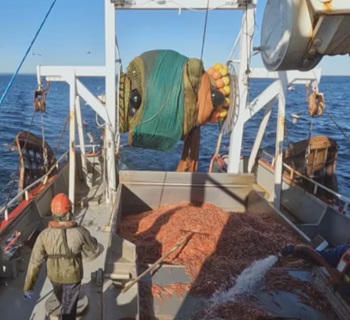 Every year, Fourchette Bleue, which promotes what it calls “under-exploited” marine species in the St. Lawrence for consumption, releases a list of recommended sustainable seafood products for consumers. Toad crabs, oysters and green sea urchins all made the cut this year, but for the first time, the northern shrimp did not. That’s because stocks of the shrimp have taken a major dive in recent years, causing concern in the local fishing industry as Fisheries and Oceans Canada (DFO) floats the idea of potentially closing fisheries in the near future. more, >>click to read<< 07:28
Every year, Fourchette Bleue, which promotes what it calls “under-exploited” marine species in the St. Lawrence for consumption, releases a list of recommended sustainable seafood products for consumers. Toad crabs, oysters and green sea urchins all made the cut this year, but for the first time, the northern shrimp did not. That’s because stocks of the shrimp have taken a major dive in recent years, causing concern in the local fishing industry as Fisheries and Oceans Canada (DFO) floats the idea of potentially closing fisheries in the near future. more, >>click to read<< 07:28
Newfoundland capelin out of ‘critical zone,’ but not because there are more fish
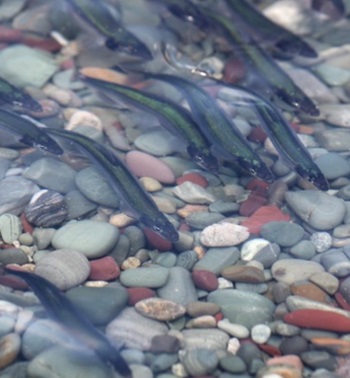 Scientists say they no longer consider the capelin off Newfoundland’s east coast to be in the critical zone, but it’s not because there are more fish. Federal Fisheries Department scientists say they’ve adjusted the benchmark for the critical zone designation, which is used for fish stocks struggling to recover. The adjustment follows a similar decision last year to adjust the critical zone benchmark for the region’s cod stocks. The shimmery sardine-sized pelagic fish are an important food source for cod, and scientists say the coinciding adjustments reflect cod’s dependence on capelin. more, >>click ti read<< 18:55
Scientists say they no longer consider the capelin off Newfoundland’s east coast to be in the critical zone, but it’s not because there are more fish. Federal Fisheries Department scientists say they’ve adjusted the benchmark for the critical zone designation, which is used for fish stocks struggling to recover. The adjustment follows a similar decision last year to adjust the critical zone benchmark for the region’s cod stocks. The shimmery sardine-sized pelagic fish are an important food source for cod, and scientists say the coinciding adjustments reflect cod’s dependence on capelin. more, >>click ti read<< 18:55
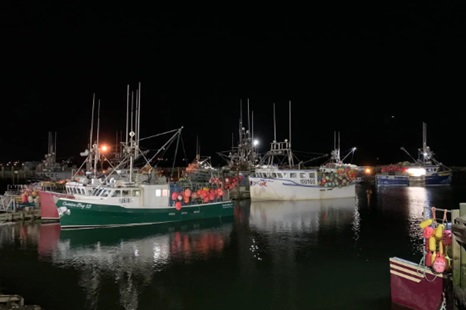
Lobster prices hit record high in southwest N.S.
A record high for lobster prices in southwestern Nova Scotia. It’s going for about 19 dollars a pound on the wharf. It’s a great price for captains, but catches are reportedly down this year. Dan Fleck with the Brazil Rock 33/34 Lobster Association says the price is great, but they have to consider the market. “Will some restaurants or buyers in overseas markets take lobster off their menu because it’s being priced out of range? That’s something that’s being dealt with,” said Fleck. more, >> click to read<< 14:28
For a 2nd day, harvesters call on N.L. government to open market to outside buyers
 For a second day in a row, fish and crab harvesters voiced their grievances at a Newfoundland and Labrador government building over constraints imposed on their catches. On Wednesday morning, harvesters congregated at the parking lot of the provincial government’s Department of Fisheries and Aquaculture building, also known as the Petten Building, located on Strawberry Road in St. John’s. They blocked the entrance, preventing employees from entering. John Efford, a harvester who was part of the protest, said they were gathered to reiterate their message from the previous day. He said companies have taken advantage of government policies “to create a cartel and collude to control the fishery” and that the government could change that policy and fix the situation. Photos, Video, more, >>click to read<< 11:28
For a second day in a row, fish and crab harvesters voiced their grievances at a Newfoundland and Labrador government building over constraints imposed on their catches. On Wednesday morning, harvesters congregated at the parking lot of the provincial government’s Department of Fisheries and Aquaculture building, also known as the Petten Building, located on Strawberry Road in St. John’s. They blocked the entrance, preventing employees from entering. John Efford, a harvester who was part of the protest, said they were gathered to reiterate their message from the previous day. He said companies have taken advantage of government policies “to create a cartel and collude to control the fishery” and that the government could change that policy and fix the situation. Photos, Video, more, >>click to read<< 11:28

Tensions run high as crab harvesters call on N.L. government to introduce outside buyers
More than 150 fishermen led an anger-fueled protest on the steps of Confederation Building on Tuesday, calling on the Newfoundland and Labrador government to free up the fishery and allow harvesters to sell their product to outside buyers. Under the current rules, harvesters are only allowed to sell their catch to processors in the province at a price agreed upon by the Fish, Food & Allied Workers union and the Association of Seafood Producers. Harvesters are calling on the province to give them more control over where they can sell their catch and how much they can sell it for. “The plants are telling us when to come and when to go and how much crab to bring…. So we need some free enterprise to be able to go as we please and fish as we please,” said Dwayne Maher, a crab fisherman of more than 30 years from Salvage. Photos, video, more, >>click to read<< 20:52
2024 Maritime elver season officially cancelled
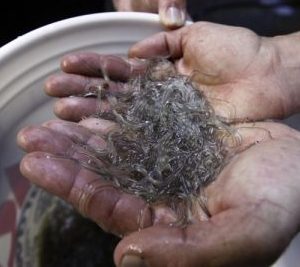 The federal government has carried through on its threat to cancel the 2024 season for baby eels, also known as elvers, in the Maritimes admitting it is unable to manage the lucrative — but increasingly chaotic — fishery. In a statement on Monday, Fisheries and Oceans Minister Diane Lebouthillier cited “significant quantities of elvers being fished illegally” and “harassment, threats and violence between harvesters and toward fishery officers.” “In the light of all these considerations, it is clear that without significant changes, the risks to conservation of the species cannot be addressed and orderly management of the fishery cannot be restored,” she said. more, >>click to read<< 06:39
The federal government has carried through on its threat to cancel the 2024 season for baby eels, also known as elvers, in the Maritimes admitting it is unable to manage the lucrative — but increasingly chaotic — fishery. In a statement on Monday, Fisheries and Oceans Minister Diane Lebouthillier cited “significant quantities of elvers being fished illegally” and “harassment, threats and violence between harvesters and toward fishery officers.” “In the light of all these considerations, it is clear that without significant changes, the risks to conservation of the species cannot be addressed and orderly management of the fishery cannot be restored,” she said. more, >>click to read<< 06:39
Minister Lebouthillier’s decision regarding the elver fishery in 2024
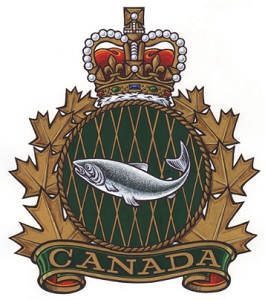 First and foremost, I would like to thank elver license holders, Indigenous communities and the public for the input that was shared with me on this year’s elver fishery. Our government is committed to the conservation of American eel, with sustainability and orderly management as the top priorities for the elver fishery. As you know, over the last few years we have unfortunately seen a pattern of increasing and very serious challenges in the elver fishery, including significant quantities of elvers being fished illegally, jeopardizing the conservation of the species. The fishery has also become the focus of harassment, threats and violence between harvesters and toward fishery officers, with a number of confrontations and incidents of violence creating an immediate threat to the management of the fishery and public safety. This undermines international and domestic efforts to sustainably manage elver fisheries. more, >>click to read<< 18:38
First and foremost, I would like to thank elver license holders, Indigenous communities and the public for the input that was shared with me on this year’s elver fishery. Our government is committed to the conservation of American eel, with sustainability and orderly management as the top priorities for the elver fishery. As you know, over the last few years we have unfortunately seen a pattern of increasing and very serious challenges in the elver fishery, including significant quantities of elvers being fished illegally, jeopardizing the conservation of the species. The fishery has also become the focus of harassment, threats and violence between harvesters and toward fishery officers, with a number of confrontations and incidents of violence creating an immediate threat to the management of the fishery and public safety. This undermines international and domestic efforts to sustainably manage elver fisheries. more, >>click to read<< 18:38
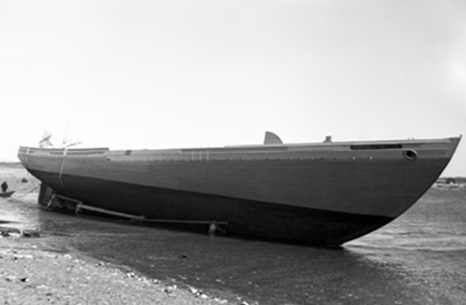
The Grandys of Garnish: A history of shipbuilding and lobster fishing in a tiny N.L. town
During the heyday of the schooner bank fishery, from the late 1800s up to the 1940s, shipbuilding was the major employer in Garnish. Dozens of carpenters and labourers were involved, from cutting the timbers up around the headwaters of the Garnish and Black rivers to operating sawmills downstream and then the actual building of the vessels. The industry reached its peak in the mid 1930s, when in one year, according to 97-year-old Melvin Grandy, five boats were being built at the same time. The five vessels were different size banking schooners, capable of carrying anywhere from four dories up to 12 dories each. Without a doubt the master boat builder in the Garnish of the 1930s and ’40s was Cephas Grandy. His reputation as a craftsman spread not only all around Newfoundland but also on the Canadian mainland. photos, >>click to read<< 07:04
Keeping an Industry Afloat – Thomas Goulding’s Cork Mill
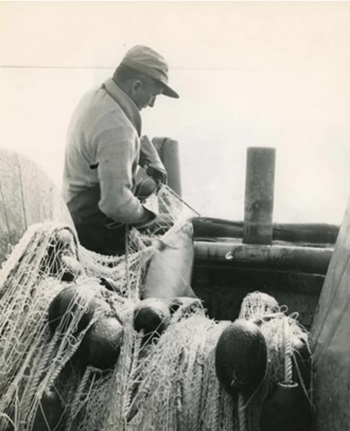 Plastic floats have taken over the market since the 1950s, but before then fishing floats were almost exclusively made of cork or wood. The wooden ones were known as “cedar corks” and the only commercial supplier of them on the West Coast was Thomas Goulding who produced them in his Cork Mill at the Acme Cannery on Sea Island. The Acme Cannery was built in 1899, part of the boom in cannery construction during the late 19th and early 20th centuries to take advantage of the seemingly unlimited supply of salmon available in the Fraser River. In 1902 it was absorbed into the British Columbia Packers amalgamation. In 1918 it closed, but the buildings, net racks and moorage were maintained for the community of fishermen, mostly Japanese, who lived around it. In a small building on the west side of the cannery Mr. Goulding set up the cork mill. The building and all the equipment for the mill, the saws, the lathes, the reamer, the stringer and the tar vat were all hand-built by him with help from his Japanese Neighbours. Photos, maps, more, >>click to read<< 13:38
Plastic floats have taken over the market since the 1950s, but before then fishing floats were almost exclusively made of cork or wood. The wooden ones were known as “cedar corks” and the only commercial supplier of them on the West Coast was Thomas Goulding who produced them in his Cork Mill at the Acme Cannery on Sea Island. The Acme Cannery was built in 1899, part of the boom in cannery construction during the late 19th and early 20th centuries to take advantage of the seemingly unlimited supply of salmon available in the Fraser River. In 1902 it was absorbed into the British Columbia Packers amalgamation. In 1918 it closed, but the buildings, net racks and moorage were maintained for the community of fishermen, mostly Japanese, who lived around it. In a small building on the west side of the cannery Mr. Goulding set up the cork mill. The building and all the equipment for the mill, the saws, the lathes, the reamer, the stringer and the tar vat were all hand-built by him with help from his Japanese Neighbours. Photos, maps, more, >>click to read<< 13:38
Talks continue on catch limits before moratorium lifts on East Coast redfish fishery
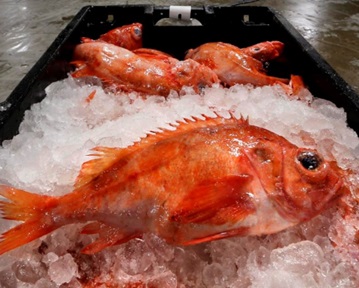 The federal Fisheries Department (DFO), says it is still collecting feedback on how to reopen the redfish fishery this spring in the Gulf of St. Lawrence, after collapsing stocks led to a decades-long moratorium. The department says in a news release that it wrapped up four days of meetings with the industry-government redfish advisory committee in Halifax on Thursday. Participants included representatives from Indigenous groups, industry, provincial governments and environmental organizations. more, >>click to read<< 11:31
The federal Fisheries Department (DFO), says it is still collecting feedback on how to reopen the redfish fishery this spring in the Gulf of St. Lawrence, after collapsing stocks led to a decades-long moratorium. The department says in a news release that it wrapped up four days of meetings with the industry-government redfish advisory committee in Halifax on Thursday. Participants included representatives from Indigenous groups, industry, provincial governments and environmental organizations. more, >>click to read<< 11:31
Climate change risk low to moderate for billion-dollar Nova Scotia lobster fishery, study says
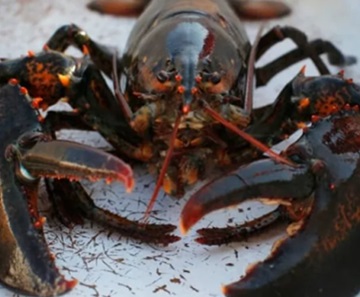 According to a new climate change vulnerability assessment of the billion-dollar Nova Scotia lobster fishery, warming temperatures over the next three decades pose a low to moderate risk for lobsters. “The cumulative outcome suggests that the provincial lobster fishery is largely not at high risk,” says the Centre for Applied Marine Research (CMAR). The provincial government agency undertook the assessment as part of adaptation planning for a key industry. Seafood is Nova Scotia’s largest export with lobster accounting for nearly two thirds of landed value. Seafood landings were valued at $1.65 billion in 2021 more, >>click to read<< 10:38
According to a new climate change vulnerability assessment of the billion-dollar Nova Scotia lobster fishery, warming temperatures over the next three decades pose a low to moderate risk for lobsters. “The cumulative outcome suggests that the provincial lobster fishery is largely not at high risk,” says the Centre for Applied Marine Research (CMAR). The provincial government agency undertook the assessment as part of adaptation planning for a key industry. Seafood is Nova Scotia’s largest export with lobster accounting for nearly two thirds of landed value. Seafood landings were valued at $1.65 billion in 2021 more, >>click to read<< 10:38
Lobster prices at the wharf hit $18 a pound in Nova Scotia
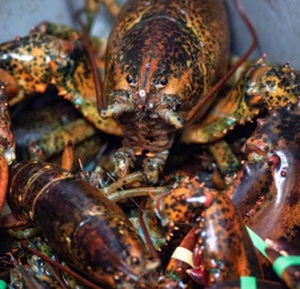 Low catches, low inventory and strong demand are driving the price increase in lobster fishing areas from Halifax to Digby. “It’s surprising, I don’t think anyone expected $18 a pound when the season opened,” said Heather Mulock of the Coldwater Lobster Association, which represents lobster fishermen in southwest Nova Scotia. “There were not a lot of catches and that is reflected in the price.” In Halifax, Sobeys is selling live lobster for $18.99 a pound. Buyer Stewart Lamont of Tangier Lobster fears the high price could bump the crustacean off restaurant menus. more, >>click to read<< 14:32
Low catches, low inventory and strong demand are driving the price increase in lobster fishing areas from Halifax to Digby. “It’s surprising, I don’t think anyone expected $18 a pound when the season opened,” said Heather Mulock of the Coldwater Lobster Association, which represents lobster fishermen in southwest Nova Scotia. “There were not a lot of catches and that is reflected in the price.” In Halifax, Sobeys is selling live lobster for $18.99 a pound. Buyer Stewart Lamont of Tangier Lobster fears the high price could bump the crustacean off restaurant menus. more, >>click to read<< 14:32
Fisherman told to either drop DFO complaint of controlling agreement or risk losing home
 An inshore fisherman from La Scie whose commercial fishing enterprise is being seized by a receiver for the bank has been given until this Thursday, March 7th, to either retract a recent declaration to DFO that he was in an illegal controlling agreement, or risk losing his home. “No fisherman should be put in that impossible position,” says inshore fisheries advocate Ryan Cleary. “It’s the latest example of how the entire system works against the inshore fleet.” Jimmy Lee Foss purchased the F/V Ocean Surfer II and a suite of commercial licences (including snow crab and shrimp) in April 2022 with a $3.8-million loan from the CIBC. According to Foss, the deal was arranged and co-signed by local fish processor Robin Quinlan of Quinlan Brothers Ltd. more, >>click to read<< 11:32
An inshore fisherman from La Scie whose commercial fishing enterprise is being seized by a receiver for the bank has been given until this Thursday, March 7th, to either retract a recent declaration to DFO that he was in an illegal controlling agreement, or risk losing his home. “No fisherman should be put in that impossible position,” says inshore fisheries advocate Ryan Cleary. “It’s the latest example of how the entire system works against the inshore fleet.” Jimmy Lee Foss purchased the F/V Ocean Surfer II and a suite of commercial licences (including snow crab and shrimp) in April 2022 with a $3.8-million loan from the CIBC. According to Foss, the deal was arranged and co-signed by local fish processor Robin Quinlan of Quinlan Brothers Ltd. more, >>click to read<< 11:32Gifford Cooke, co-founder of Cooke Aquaculture, dies at 85
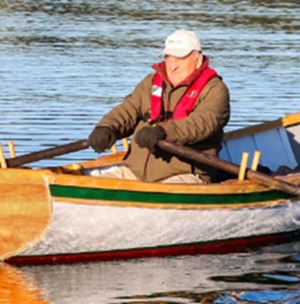 Gifford Cooke, who founded the now global seafood company Cooke Aquaculture from its humble beginnings in southwest New Brunswick, died on Sunday at 85. Cooke founded the company with his sons, Glenn and Michael, by setting up their first salmon farm at Kelly Cove in 1985, Cooke’s website says. They purchased their first hatchery in Oak Bay in 1989, and Cooke Aquaculture was established four years later. The company’s main brand, True North Salmon, has been used since 1994. Today, the company has nearly 13,000 employees and oversees a family of 13 brands, and Cooke Aquaculture remains based in New Brunswick. Premier Blaine Higgs released a statement on Monday to express his condolences, calling the locally-based company “a global success.” Photos, more, >>click to read<< 13:33
Gifford Cooke, who founded the now global seafood company Cooke Aquaculture from its humble beginnings in southwest New Brunswick, died on Sunday at 85. Cooke founded the company with his sons, Glenn and Michael, by setting up their first salmon farm at Kelly Cove in 1985, Cooke’s website says. They purchased their first hatchery in Oak Bay in 1989, and Cooke Aquaculture was established four years later. The company’s main brand, True North Salmon, has been used since 1994. Today, the company has nearly 13,000 employees and oversees a family of 13 brands, and Cooke Aquaculture remains based in New Brunswick. Premier Blaine Higgs released a statement on Monday to express his condolences, calling the locally-based company “a global success.” Photos, more, >>click to read<< 13:33
Lobster tagged in New Brunswick caught over 250 kilometres away in Maine
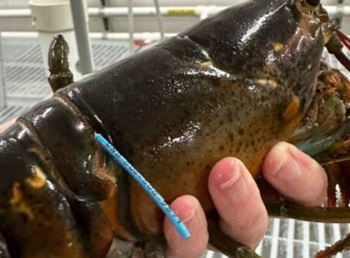 Emily Blacklock was scrolling through social media when she spotted a video of a Maine fisherman hauling in an unexpected catch, a lobster with a tag from her research team found hundreds of kilometres away from where it was attached in New Brunswick. “All of a sudden I saw one of our blue tags, so I ended up messaging him,” she said. “We all know it’s possible that lobsters go from the Bay of Fundy to the Gulf of Maine, but the chance of him being the one to catch that lobster and make a video was fantastic.” Blacklock, a PhD candidate at the University of New Brunswick, is part of a team of researchers trying to find a way to identify the age of lobsters. Photos, more, >>click to read<< 16:49
Emily Blacklock was scrolling through social media when she spotted a video of a Maine fisherman hauling in an unexpected catch, a lobster with a tag from her research team found hundreds of kilometres away from where it was attached in New Brunswick. “All of a sudden I saw one of our blue tags, so I ended up messaging him,” she said. “We all know it’s possible that lobsters go from the Bay of Fundy to the Gulf of Maine, but the chance of him being the one to catch that lobster and make a video was fantastic.” Blacklock, a PhD candidate at the University of New Brunswick, is part of a team of researchers trying to find a way to identify the age of lobsters. Photos, more, >>click to read<< 16:49
Put rules in writing to fix Maritime elver fishery’s enforcement problem, say businesses
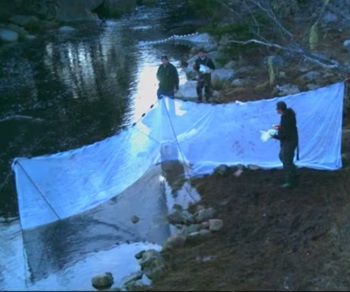 Representatives of the $45-million Maritime elver fishery are calling on the federal government to implement enforceable regulations for moderate livelihood fishing by Indigenous people. They told a Senate committee in Ottawa Thursday the failure to define or regulate moderate livelihood rights by the Department of Fisheries and Oceans (DFO) is one reason for the uncontrolled harvest of baby eels on dozens of rivers in Nova Scotia and New Brunswick. “Among these poachers are First Nations unwilling to work with DFO to access the fishery under a banner of moderate livelihood rights, backed by organized crime, specifically biker gangs and foreign smuggling networks. Our once peaceful industry has recently faced violent disruption,” said Genna Carey, a commercial licence holder speaking on behalf of the Canadian Committee for a Sustainable Eel Fishery, an industry group. more, >>click to read<< 09:29
Representatives of the $45-million Maritime elver fishery are calling on the federal government to implement enforceable regulations for moderate livelihood fishing by Indigenous people. They told a Senate committee in Ottawa Thursday the failure to define or regulate moderate livelihood rights by the Department of Fisheries and Oceans (DFO) is one reason for the uncontrolled harvest of baby eels on dozens of rivers in Nova Scotia and New Brunswick. “Among these poachers are First Nations unwilling to work with DFO to access the fishery under a banner of moderate livelihood rights, backed by organized crime, specifically biker gangs and foreign smuggling networks. Our once peaceful industry has recently faced violent disruption,” said Genna Carey, a commercial licence holder speaking on behalf of the Canadian Committee for a Sustainable Eel Fishery, an industry group. more, >>click to read<< 09:29
B.C. seeks $6 million in properties allegedly tied to illegal crab-sales scheme
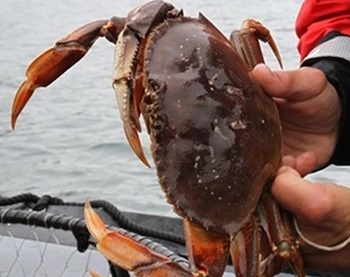 The B.C. government is seeking forfeiture of properties valued at more than $6 million that it alleges were tied to a scheme to sell illegally crabs that were meant for food for First Nations. In a lawsuit filed in B.C. Supreme Court, the province alleges that two commercial properties in Richmond, a house in Vancouver and a pickup truck, are the instruments and proceeds of “unlawful activity” linked to the illegal crab-sales scheme. Named in the suit are Jamin Chiong, who sold the crab to seafood wholesaler Million Ocean Seafood Ltd., and the owners of that company, Tsz Wah Fok, Peng Lin and Tak Yi Tong. None of those named in the suit have responded and the allegations have not been proven in court. more, >>click to read<< 18:47
The B.C. government is seeking forfeiture of properties valued at more than $6 million that it alleges were tied to a scheme to sell illegally crabs that were meant for food for First Nations. In a lawsuit filed in B.C. Supreme Court, the province alleges that two commercial properties in Richmond, a house in Vancouver and a pickup truck, are the instruments and proceeds of “unlawful activity” linked to the illegal crab-sales scheme. Named in the suit are Jamin Chiong, who sold the crab to seafood wholesaler Million Ocean Seafood Ltd., and the owners of that company, Tsz Wah Fok, Peng Lin and Tak Yi Tong. None of those named in the suit have responded and the allegations have not been proven in court. more, >>click to read<< 18:47
Vancouver Island fishermen to be honored for daring sea rescue
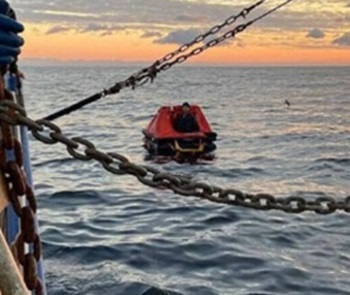 As Ryan Planes was in the middle of setting out his fishing gear off the West Coast of Vancouver Island in October, he noticed a bright orange speck about half a kilometre away. Upon first glance, he mistook it for ocean debris. Then, as he peered through his binoculars, he identified a life-raft, with a man waving a paddle, signalling for help. A few moments later, the man set off what was his last flare. The crew of five people on the Ocean Sunset, including Capt. John Planes (Ryan’s uncle), had found a mariner who had been adrift at sea on a life raft for almost two weeks. more, >>click to read<< 16:40
As Ryan Planes was in the middle of setting out his fishing gear off the West Coast of Vancouver Island in October, he noticed a bright orange speck about half a kilometre away. Upon first glance, he mistook it for ocean debris. Then, as he peered through his binoculars, he identified a life-raft, with a man waving a paddle, signalling for help. A few moments later, the man set off what was his last flare. The crew of five people on the Ocean Sunset, including Capt. John Planes (Ryan’s uncle), had found a mariner who had been adrift at sea on a life raft for almost two weeks. more, >>click to read<< 16:40
Snow crab stock projected to remain healthy, for the most part, in 2024
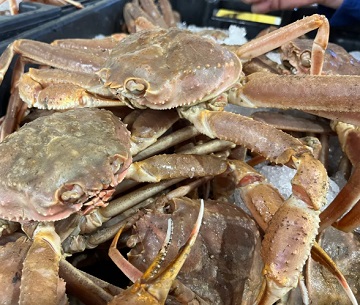 Fisheries and Oceans Canada released its annual stock assessment on snow crab Tuesday in St. John’s, and the data indicates the stock remains on par with last year with no major changes. That means the stock is projected to remain healthy for the majority of fishing areas around the province, with one exception. The 2HJ zone off the east coast of Labrador remains in the cautious zone, similar to last year’s assessment. But the positive news may be a result of an ocean cooling period that happened between 2012 and 2018. Snow crab flourish in colder water, allowing young crab the ability to grow to exploitable age and size. That’s between nine and 13 years old with a shell size of over 94 mm for males. Female crab cannot be retained by harvesters. more, >>click to read<< 15:06
Fisheries and Oceans Canada released its annual stock assessment on snow crab Tuesday in St. John’s, and the data indicates the stock remains on par with last year with no major changes. That means the stock is projected to remain healthy for the majority of fishing areas around the province, with one exception. The 2HJ zone off the east coast of Labrador remains in the cautious zone, similar to last year’s assessment. But the positive news may be a result of an ocean cooling period that happened between 2012 and 2018. Snow crab flourish in colder water, allowing young crab the ability to grow to exploitable age and size. That’s between nine and 13 years old with a shell size of over 94 mm for males. Female crab cannot be retained by harvesters. more, >>click to read<< 15:06
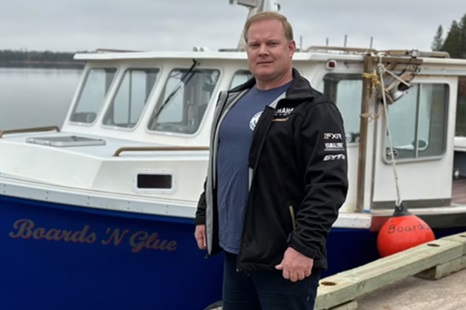
High lobster prices could be a sign of things to come for P.E.I.’s spring fishery
The cost of the crustaceans in most stores is higher than normal for this time of year, running anywhere from $20 to $26 per pound. Most of the lobster caught last year and stored on the Island has already been sold, and fewer boats take part in the winter fishing season in nearby New Brunswick and Nova Scotia. Charlie McGeoghegan, chair of the Lobster Fishers of P.E.I. Marketing Board, said there are only 2,500 boats on the water in Canada right now, compared to 7,000-plus during the spring season. “The boat prices are anywhere from $16.50 to $17.25 — [that’s] what we’re hearing.” more, >>click to read<< 06:50
Commercial Fisherman Scott Dicks of Grand Bank has passed away
 It is with broken hearts that the family of the late Scott Dicks of Grand Bank announces his passing. Scott passed away on the FV Anne Risley in Mulgrave, NS on February 22, 2024 at the age of 36. Leaving to mourn with a lifetime of wonderful memories are the love of his life for 14 years; Nicole; his son, Anthony of Grand Bank; his daughter, Olivia of NB; their daughter, Naomi of Grand Bank; mother, Ellie Keeping; father, Hughie Dicks (Petchie); sister, Tricia (Adam – brother in-law & Best Friend); sister in-law, Nickita Hillier (Jamie); nephews, Addison & Jaxxon; parents in-law, Nick & Sandra House; Best Buddy, Frank; shipmates & work family, crew of the FV Anne Risley; plus a large circle of aunts, uncles, many, many cousins, whom he loved dearly, extended family and friends. more, >>click to read<< 08:55
It is with broken hearts that the family of the late Scott Dicks of Grand Bank announces his passing. Scott passed away on the FV Anne Risley in Mulgrave, NS on February 22, 2024 at the age of 36. Leaving to mourn with a lifetime of wonderful memories are the love of his life for 14 years; Nicole; his son, Anthony of Grand Bank; his daughter, Olivia of NB; their daughter, Naomi of Grand Bank; mother, Ellie Keeping; father, Hughie Dicks (Petchie); sister, Tricia (Adam – brother in-law & Best Friend); sister in-law, Nickita Hillier (Jamie); nephews, Addison & Jaxxon; parents in-law, Nick & Sandra House; Best Buddy, Frank; shipmates & work family, crew of the FV Anne Risley; plus a large circle of aunts, uncles, many, many cousins, whom he loved dearly, extended family and friends. more, >>click to read<< 08:55








































